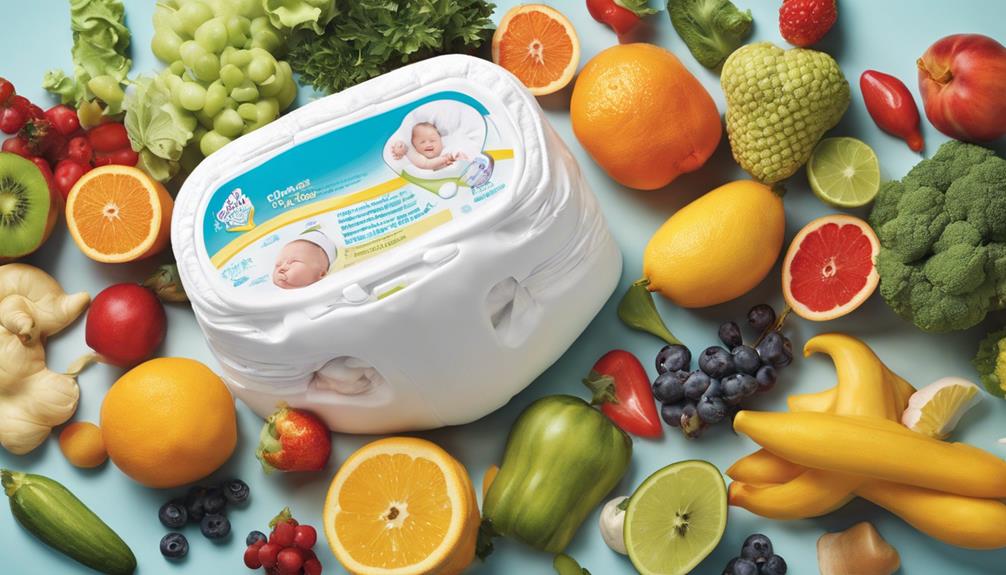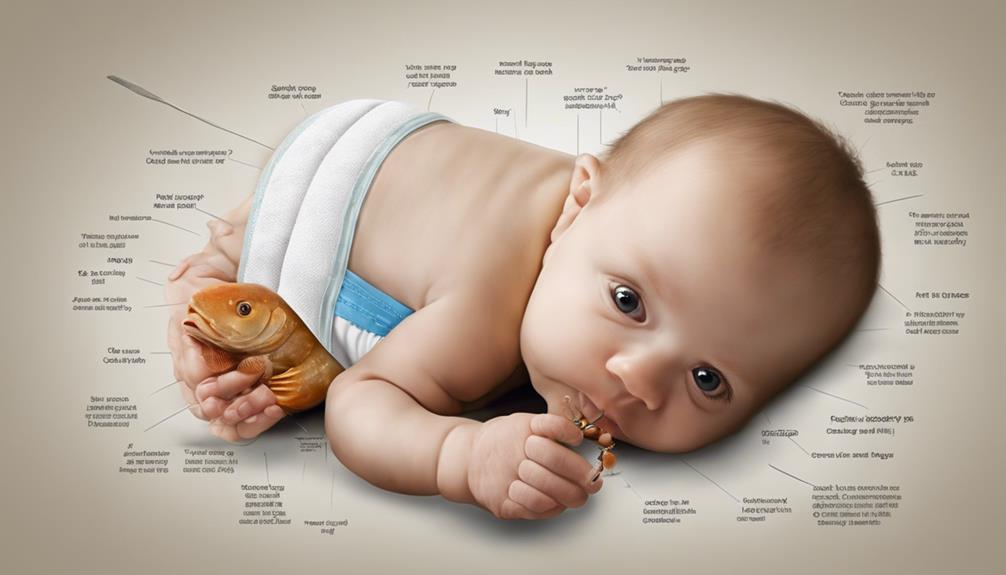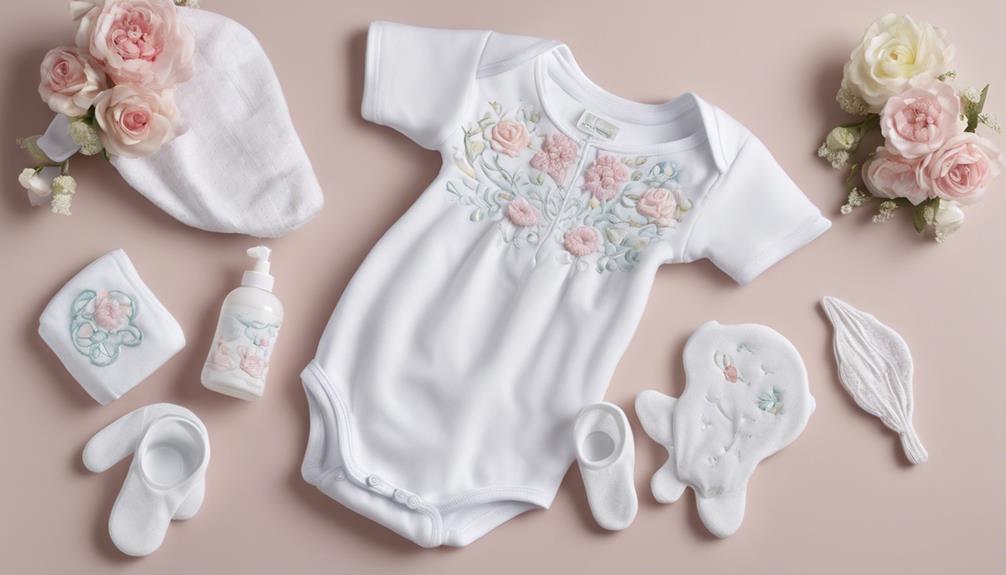If you've ever wondered what a fish market might smell like in your newborn's diaper, you're not alone. Detecting a fishy odor in your baby's poop can be a cause for concern and prompt a closer look into potential underlying issues.
Understanding the reasons behind this unusual smell is important for your baby's health, and knowing how to differentiate between normal and concerning aromas is critical. Let's explore the nuances of identifying and addressing fishy-smelling poop in newborns to make sure your little one's well-being remains a top priority.
Key Takeaways
- Fishy odor in newborn's poop can indicate health issues.
- Consult a pediatrician for persistent or sudden changes in smell.
- Monitor baby's diet and seek guidance if fish-like smell persists.
- Maintain good hygiene and seek medical help if smell worsens.
Fishy Odor in Newborn's Poop
Fishy odor in a newborn's poop can be a significant indicator of underlying health issues. If a baby's stool emits a fishy smell, it might suggest food sensitivities, especially if the mother is breastfeeding and consuming certain foods. Digestive infections caused by bacteria or parasites can also result in a persistent fishy odor in the baby's poop. Additionally, antibiotic use can disrupt the delicate balance of the baby's gut microbiome, leading to foul-smelling poop with a fishy scent.
In rare cases, a fishy smell in a newborn's poop could signify a more serious condition like bowel obstruction. This requires immediate medical attention. Moreover, green stool with a fishy odor in newborns might be a sign of infections such as salmonella or cholera. These infections necessitate prompt medical evaluation to determine the appropriate treatment and safeguard the baby's health and well-being. If you notice a fishy smell in your newborn's poop, it's essential to consult a healthcare provider for a thorough assessment.
Signs of Unusual Smell in Baby's Stool
Upon noticing an unusual smell in a baby's stool, prompt consultation with a pediatrician is important for proper evaluation and potential intervention. Changes in a baby's poop smell can be a sign of underlying issues that need attention. Here are three signs of an unusual smell in a baby's stool:
- Persistent Fishy Odor: If your baby's stool consistently has a fish-like smell, it could indicate digestive problems, food sensitivities, bacterial infections, or enzyme deficiencies.
- Unusual Smell Changes: Any sudden shift in the odor of your baby's poop, especially to a fishy aroma, should be discussed with a healthcare provider to rule out any concerning issues.
- Accompanying Symptoms: Pay attention to any additional symptoms such as diarrhea, blood in the stool, or signs of discomfort, as these could be indications of an infection or other digestive issues.
Monitoring your baby's stools for any persistent fishy smell and related symptoms is crucial for early detection and appropriate management of potential health concerns.
Identifying Fish-Like Smell in Infant's Poop
Regularly monitoring your newborn's stool for any distinctive odors is important in identifying potential health issues, with a fish-like smell indicating possible underlying concerns. A fishy odor in a newborn's poop can be a sign of infections, digestive problems, or other health issues. Factors such as the mother's diet, food sensitivities, or gastrointestinal infections can contribute to this distinct smell in your infant's stool.
If you notice a persistent fish-like smell, especially when accompanied by changes in stool color or consistency, it's vital to seek guidance from a pediatrician. Monitoring for any unusual smells, including a fishy odor, can help you stay proactive in your baby's health. While some changes in stool odor are normal, a consistent fish-like smell shouldn't be overlooked.
Your pediatrician can provide further evaluation and recommend appropriate steps to address any potential health implications related to your newborn's poop.
Understanding Potential Health Implications

Understanding the potential health implications of a fishy smell in your newborn's poop is important for ensuring prompt medical intervention and appropriate management. When faced with this situation, it's vital to take into account the following:
- Underlying Health Issues: A persistent fishy smell in your newborn's poop could point towards underlying health issues such as gastrointestinal infections, food sensitivities, or conditions like giardiasis. These issues may require specific treatments and interventions.
- Reactions to New Foods: Introducing new foods to your baby's diet can sometimes lead to a change in stool odor. Monitoring your baby's reactions to new foods can help identify potential triggers for the fishy smell.
- Symptoms Monitoring: Alongside the fishy smell, it's important to monitor for other symptoms like diarrhea, vomiting, fever, or decreased appetite. These additional signs can provide valuable information to healthcare providers regarding the potential health implications of the fishy smelling poop.
Steps to Address Fishy Smelling Poop
When addressing fishy smelling poop in newborns, it's important to monitor any persistent odor changes as it could indicate an underlying health concern that requires prompt attention and management.
If your baby's poop smells fishy consistently, consulting with your pediatrician is essential. Additionally, keeping track of your newborn's diet and any recent changes can help identify the source of the odor.
Maintaining good hygiene practices during diaper changes is vital to prevent infections that may lead to a foul-smelling stool. If the fishy smell persists or worsens despite home interventions, seeking medical attention promptly is recommended.
Frequently Asked Questions
Why Does My Newborn's Poop Smell Fishy?
We explore various reasons why a newborn's poop may smell fishy, from food sensitivities in the mother's diet to digestive infections. Antibiotic use and rare bowel obstructions can also contribute. If concerned, seek medical advice promptly.
How Should Newborn Poop Smell?
Our newborn's poop should smell sweet if breastfed or pasty with a mild scent if formula-fed. A persistent fishy odor may suggest an underlying issue. A consistently foul smell isn't normal. Expect some odor, but a strong, fishy aroma warrants attention.
What Does Rotavirus Poop Smell Like?
Rotavirus poop carries a distinct fishy odor due to its impact on the digestive system. Accompanied by symptoms like watery stools and fever, this smell helps identify the viral infection. Prompt medical attention is essential.
What Does Sick Baby Poop Smell Like?
Wondering what sick baby poop smells like? A strong fishy odor can signal serious digestive issues. Seeking medical advice promptly is important, as persistent fishy smells in your newborn's poop may indicate underlying health problems.
Conclusion
To sum up, if your newborn's poop smells like fish, it's important to consult a pediatrician for proper evaluation and guidance. Trust your instincts as a parent and don't sweep potential issues under the rug.
Remember, addressing the fishy smell early on can prevent bigger problems down the line. So, don't be afraid to tackle this head-on and nip it in the bud. Your baby's health is worth the extra effort.










